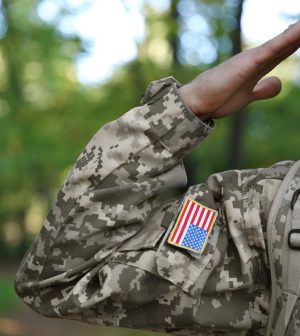- Could Your Grocery Store Meat Be Causing Recurring UTIs?
- Are You Making This Expensive Thermostat Error This Winter?
- Recognizing the Signs of Hypothyroidism
- 10 Strategies to Overcome Insomnia
- Could Artificial Sweeteners Be Aging the Brain Faster?
- Techniques for Soothing Your Nervous System
- Does the Water in Your House Smell Funny? Here’s Why
- Can a Daily Dose of Apple Cider Vinegar Actually Aid Weight Loss?
- 6 Health Beverages That Can Actually Spike Your Blood Sugar
- Treatment Options for Social Anxiety Disorder
Federal Judge Rules That U.S. Military Cannot Reject HIV-Positive Enlistees

People with HIV can no longer be turned away if they try to enlist in the U.S. military, a federal judge has ruled.
The decision, issued this week by U.S. District Judge Leonie Brinkma, said the Pentagon’s ban on HIV-positive people seeking to join the armed forces contributes “to the ongoing stigma surrounding HIV-positive individuals while actively hampering the military’s own recruitment goals.”
“Modern science has transformed the treatment of HIV,” Brinkema wrote in her ruling. “Asymptomatic HIV-positive service members with undetectable viral loads who maintain treatment are capable of performing all of their military duties, including worldwide deployment.”
Importantly, HIV can’t be spread through saliva, sweat, tears, group exercise or sharing a bathroom. Instead, most people get HIV through anal or vaginal sex or when sharing needles, according to the U.S. Centers for Disease Control and Prevention.
Antiretroviral therapy can also keep HIV viral loads to low or undetectable levels, and patients who are virally suppressed won’t transmit the virus through sex or syringe-sharing, according to the CDC.
In recent years, the Pentagon’s policies toward HIV-positive Americans have come under legal fire.
In 2022, Brinkema struck down the military’s ban on people who are HIV-positive from joining the armed forces as officers or deploying abroad, CNN reported. Following that ruling, Defense Secretary Lloyd Austin issued a memo that said people who are HIV-positive will no longer be automatically barred from serving in military leadership or overseas.
The challenge to the enlistment policy was brought by three HIV-positive individuals looking to join or rejoin the military in the last few years. All three were unable to do so, CNN reported.
One of the plaintiffs, Isaiah Wilkins, was serving in the Georgia National Guard when he sought to enlist in the Army Reserve. During that process, he learned that he was HIV-positive.
“This is a victory not only for me but for other people living with HIV who want to serve,” Wilkins said in a statement issued Tuesday. “As I’ve said before, giving up on my dream to serve my country was never an option. I am eager to apply to enlist in the Army without the threat of a crippling discriminatory policy.”
The Pentagon has argued that its policy acknowledges that caring for HIV-positive service members could create financial burdens for the Department of Defense and that deployment might make it hard for HIV-positive soldiers to stick with medication regimens that keep the virus in check, CNN reported.
More information
The World Health Organization has more on HIV.
SOURCES: U.S. District Court for the Eastern District of Virginia, ruling, Aug. 20, 2024; CNN
Source: HealthDay
Copyright © 2026 HealthDay. All rights reserved.










